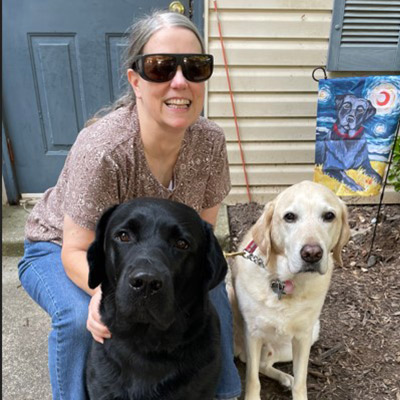When Judy Davis was a young child, her older sister started having trouble seeing at night, and tests revealed that she had retinitis pigmentosa—an eye disease that causes progressive vision loss over time. The diagnosis came as a surprise, because RP is a genetic disease that hadn’t shown up in the family before. Still, doctors thought it was a good idea to test Judy, too.
As it turns out, Judy had also been born with RP. And while most people with RP don’t have symptoms until they reach their 40s or 50s, "In my family it hit early," she says.
By the time Judy was in her early 20s, she decided it would be best to learn Braille. At that time, she was living in Pennsylvania, and the state provided her with a teacher. "But I had 2 small children running around the house," she says. "And trying to keep my kids out of trouble and learning braille from a person at the same time didn’t work." So, the teacher introduced Judy to Hadley, where she could study and learn at her own pace.
Judy was also an avid college student, earning her undergraduate degree in school media services and a master’s degree in library science. Yet with all those learning activities on her plate—not to mention parenting—she still found time for another important pastime: Going to meetings with a low vision support group.
Finding a support group was transformative for Judy, as it gave her an opportunity to share with people who had similar experiences. "This journey is so much better when you have friends that can tell you what’s ahead, and just give you guidance," she says. "I think they’re one of the best ways for people to start learning to cope with vision loss, so they know what’s possible and can share their stories and talk about things with somebody."
Ever since then, Judy has looked for support groups wherever she lives. And in each group, she’s become deeply involved, going from a participant to a contributor to a group facilitator. With her current group, in Asheville, North Carolina, she’s now a group leader, making it easier for others to connect, too.
In fact, when the Covid pandemic struck in 2020, Judy worked with Hadley to move meetings onto Zoom—and now the group is more than a local resource, drawing members from several states.
Judy lives alone with her two dogs—Orville, a black Lab who serves as her guide dog, and Prince, a yellow Lab who has retired from that position. She learned to use a white cane in her 20s, when she realized she wasn’t getting out as much as she’d like with her young daughter. Later, when she realized once again that she wasn’t walking as much as she’d like, she made the decision to get a guide dog. "It’s a very different form of travel, and I love it," she says.
For every new option that Judy’s explored, she’s been able to reach out to her support group members and others—including Hadley’s discussion groups—for their input and experiences.
She also reaches out online, taking workshops through Hadley to learn about using technology and more, where she appreciates the constant reassurance and encouragement. "That’s a big part of vision loss," Judy says. "You have to learn to be patient with yourself, learn to take that deep breath, and say, ‘OK, this can be done by other people with vision loss, so I know I can do it.’ " Recently, Judy signed up to be a peer mentor with Hadley, where she can share her own knowledge and encouragement with others.
Judy has learned a lot about vision loss over the years, and her advice for others is three-fold. First, "Don’t try to hide it," she says. "The sooner you start sharing your story with other people, the sooner people will understand." And she recommends finding a support group as a great way to start.
Second, Judy encourages people to find the tools and resources they need to stay active, explaining that exercise has been a great technique for helping her cope
with vision loss. "My walks help ground me, and I enjoy my encounters with others," she says.
And third, Judy recommends finding ways to volunteer to help others. "There is nothing like helping someone else to make one feel happier," she says.
